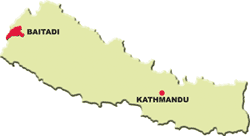 This is about as far as you can get from Kathmandu, and even here, on the kingdom's western border with India, there is an overwhelming dread of violence and fear of the future.
This is about as far as you can get from Kathmandu, and even here, on the kingdom's western border with India, there is an overwhelming dread of violence and fear of the future. Just 19km away from Jhulaghat in India's Uttaranchal state is Baitadi's newest municipality of Gothalapani. Mayor Ganesh Singh Bhandari himself is not convinced why this sleepy little village should have the grandiose label of 'municipality'. But it is true that Gothalapani's population has surged after the Maoist attack in the main town of Patan two years ago. It is also now the transit point for many Baitadi villagers fleeing across the border to India in large numbers.
After the Maoists started forcing teachers to attend their meetings in the past two months, most have abandoned their schools and come to Gothalapani for safety. Dhaulidevi Pant, 49, is the wife of a school teacher from Khaligad. The Maoists looted their house and the family has nothing left.
"We did nothing wrong, my husband is a good man, he has been teaching for 25 years," she says, sobbing. Two boys and two girls, all teenagers, came to their house four months ago and told family members to get out because the 'command' had decided to evict them. "Even my 81-year-old mother-in-law was told to get out, and she is now mentally unbalanced," says Dhaulidevi.
 The number of Nepalis who are internally displaced or forced to migrate to India because of the conflict is, according to one estimate, now about 1.5 million. These heartrending stories must be multiplied many times to gauge the true scale of misery and suffering.
The number of Nepalis who are internally displaced or forced to migrate to India because of the conflict is, according to one estimate, now about 1.5 million. These heartrending stories must be multiplied many times to gauge the true scale of misery and suffering. Dal Bahadur Bohora is from Kotkotara village, and has also fled to the relative safety of Gothalapani. His distraught face tells of his anxiety about his teenage daughter who was recently abducted by the Maoists. He does not remember the date. "It was the day before Gaura Parba. Why does it matter when she was taken away, my daughter is lost," he says and pours out his anger at the Maoists as well as the CDO, army and police who are doing nothing to help.
For Baitadi's CDO Parashuram Aryal, the sheer scale of the dislocation is hard to manage. It is very difficult to help individuals when there are thousands of them. Aryal was CDO in Dunai and has seen first hand the brutality of a Maoist attack. He is trying to help with the meagre resources at his disposal. Aryal knows Dal Bahadur personally and, even so, there is nothing he can do. "I know he is going through hell," he says, "but what can I do? I just don't have any budget even for emergency relief."
Just when you think you have heard the saddest story, there is even a sadder one. Dhan Bahadur Kunwar, a frail man from Kuwakot village, has no words to describe what he went through. He is still speechless with shock and shows us his bruised body. His small tea shop was doing well. The Maoists wanted a donation, but he couldn't afford the sum and resisted. He was beaten and forced to flee his village with his family and what was left of his belongings.
A Baitadi journalist, Laxmi Dutta Pant, says things were going from bad to worse, but in the past month Maoist extortion, eviction and threats has increased many fold. It is not just the rich people in the villages who are victims. Increasingly, small shopkeepers and subsistence farmers are being targeted.
"By night the Maoists force them to give food and shelter, and by day the army patrols come trying to find out where they are," explains Pant.
Most people we talked to here are reluctant to speak out about their ordeals. The stories of ruthless retribution and punishment they have heard means people keep quiet. Raj Bahadur Chand, a local human rights activist, says: "People from the villages are extremely frightened, they are also not comfortable with outsiders." But what is surprising is that despite their suffering and the threat of violence, there are still a lot of fearless people who will speak the truth on the record about the atrocities perpetrated by both the security forces and the Maoists. For Nepalis displaced from their homes and villages, it seems there is nothing left to lose. Speaking out is the only thing they can do.


